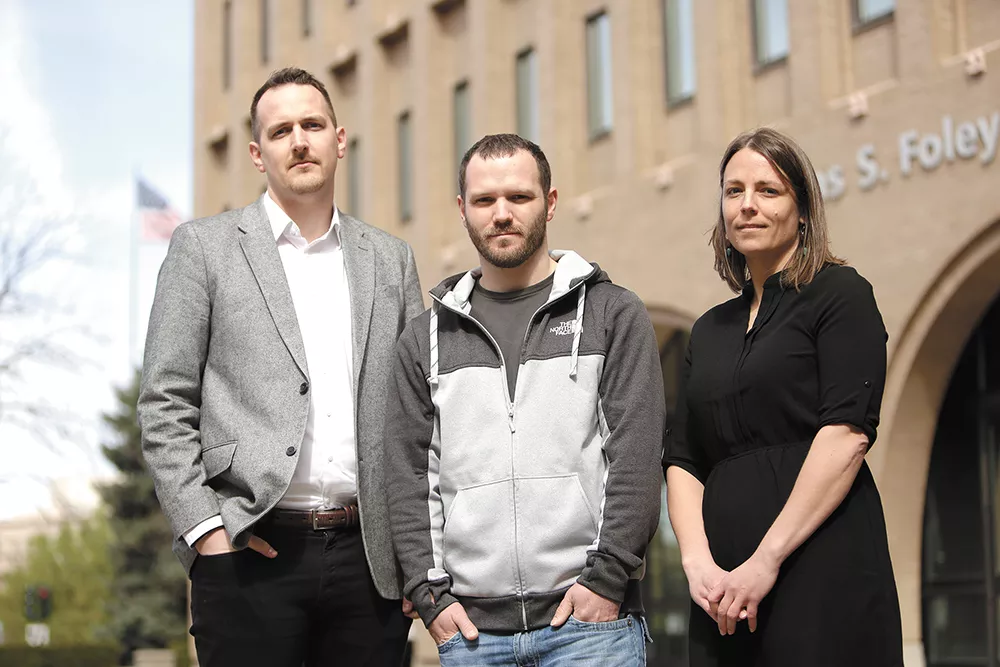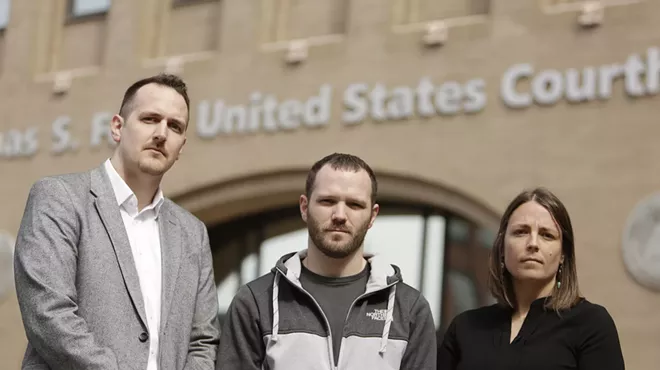
Jerad Kynaston lives with his mom. The 29-year-old has a long-term girlfriend, a puppy and has started a construction business, all while the specter of a mandatory life sentence hangs over his head. In an instant, it could all be gone, because six years ago he was busted for growing hundreds of marijuana plants in Spokane Valley.
The case has languished in the system for the past five years, and last week it seemed that Kynaston was ready for it to end; he and at least two other co-defendants were prepared to plead guilty.
But less than 48 hours before the hearing at the Thomas S. Foley U.S. Courthouse in Spokane, the defense team stumbled onto police reports written in March 2012 that federal prosecutors had not previously turned over. The pleas were scrapped.
The reports, according to Assistant U.S. Attorney Patrick Cashman's statements in court, recount conversations with at least four of the defendants, the police and at least one federal prosecutor. Cashman described those defendants as "cooperators," indicating that they were potentially giving information to law enforcement in exchange for leniency.
Defense attorneys say the five-year-old reports contain information pointing to the men's innocence, but would not elaborate, nor would they give details of the anticipated plea deals.
"I want the record to show, and everybody to understand, that this kind of delay, unless there's a good reason, is not acceptable in this court and particularly in view of the nature of this case," an indignant U.S. District Judge William F. Nielsen says from the bench. "Hanging this guillotine over these people for all these years, whether they're guilty or not guilty, is not right."
Central to this case is whether or not Kynaston and each of the co-defendants were growing medical marijuana, which has been legal in Washington state in some fashion since 1998.
The federal government cannot spend money prosecuting marijuana crimes in states where it is legal, according to what's known as the Rohrabacher-Farr amendment, which was renewed earlier this month when Congress passed a spending bill to fund the government through September.
But despite the shifting attitudes toward marijuana nationwide — 29 states allow medical marijuana, and eight, plus the District of Columbia, allow it for recreational purposes — U.S. Attorney General Jeff Sessions seems bent on dragging the country back into the "War on Drugs."
In a memo issued this month, Sessions ordered federal prosecutors to pursue the "most serious, readily provable offense," which include those that carry mandatory minimum sentences. The memo is a reversal of Obama-era policies, which allowed leniency for nonviolent drug offenses.
In 2011, local and federal law enforcement raided the house where Kynaston and seven other people were running a marijuana grow operation. Police found more than 1,000 plants (though 677 of those "plants" were either empty pots, or pots that contained "the root structure of suspected harvested marijuana plants") and one handgun.
All seven men were indicted in 2012 on violations of the Controlled Substances Act. If found guilty, some are potentially facing mandatory 10-year sentences due to the amount of marijuana that police found. With Kynaston's prior marijuana-related felony convictions, he faces a mandatory life sentence. He's also facing a firearms charge.
The recently disclosed police reports could offer evidence that the men were in compliance with state law, federal defender Alison Guernsey told Judge Nielsen. They could also indicate that the firearm linked to Kynaston actually belonged to someone else.
But beyond concerns over the content of the reports, Guernsey added, is federal prosecutors' unwillingness to initially hand them over. If not for a "fortuitous" conversation with another attorney representing a defendant who has already pleaded guilty in this case, she never would have known about the reports.
When Guernsey first asked about the reports, Assistant U.S. Attorneys Cashman and Timothy Ohms claimed ignorance. But, she points out, another federal prosecutor was present for each of the interviews detailed in the police reports.
"I find it incredibly troubling, and perhaps indicative of a larger systemic problem at the U.S. Attorney's Office, that one attorney on a case is not keeping the other attorneys on that same case in the loop as to what discovery is available," she said. "It indicates there simply is no process by which we as defense counsel, and the court as an arbiter, can be entirely sure that we're ever going to get all the information to which we're entitled."
Cashman, the federal prosecutor, told Judge Nielsen that the police reports did not contain any new information. He added that because the reports detailed interviews with "cooperating" defendants, the government had agreed to keep them confidential unless the case went to trial.
Judge Nielsen clarified that regardless of how the information was received, the government has an obligation to hand over all Brady material — any information that could point to a defendant's innocence.
The judge ordered prosecutors to review their entire case file to ensure that the defendants have every piece of information to which they're entitled. If the 2012 reports tend to point to the men's innocence, Nielsen promised sanctions "that not only impresses upon the government the importance of meeting their obligations, but also takes into account the excessive duration of time that the defendants have lived under the cloud of indictment without resolution."
Those sanctions could include monetary fines, suppression of evidence, or even dismissal of the entire case.
Calls to the U.S. Attorney's Office seeking comment were not returned.
Guernsey and other defense attorneys have declined to elaborate on specific details in the 2012 police reports, nor would they share them with the Inlander.
"We have no idea why it wasn't turned over," Guernsey says. "But it's our position that the information is material to whether Mr. Kynaston is guilty." ♦


















